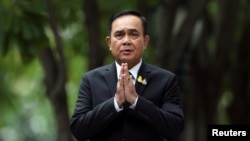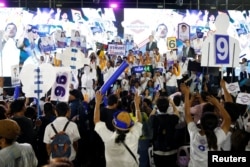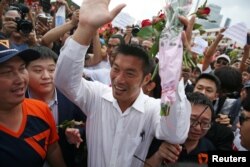When Prime Minister Prayuth Chan-ocha swears in his new cabinet later this month, the ex-general who toppled Thailand's elected government five years ago will officially return civilian rule to a country that has made a cottage industry of coup d'états.
Prayuth's May 2014 military putsch was Thailand's 13th since the kingdom morphed into a constitutional monarchy in 1932, not counting the ones that failed.
On taking power, he vowed to break that cycle by healing the deep social schisms that have riven the country in recent generations. After a half-decade of military rule, though, analysts say Thailand is as divided as ever, if not more.
Pundits already are predicting when, not if, the new government will collapse.
"I would be amazed if this government lasts the whole four-year term. ... I think the question is just how long can it go on?" said Peter Mumford, head of Southeast Asia coverage for the Eurasia Group, a political risk consultancy.
The government did not reply to multiple requests to comment for this story.
Prayuth's ruling coalition in Parliament is an awkward amalgam of 19 parties stitched together with cabinet seat handouts and competing political promises, the result of a messy general election in March that offered up no clear winners.
Pushing a platform of peace and order, the military proxy party that backed him, Palang Pracharath, won the most votes. But the two parties that campaigned hardest against him, Pheu Thai and Future Forward, combined won more. It was only a military-drafted Constitution and a junta-appointed Senate that gave Prayuth the majority of votes he needed in Parliament to stay on.
The pro-military, monarchist elite at the heart of Thailand's traditional power structure faced an old foe in Pheu Thai, the latest political machine of the billionaire Shinawatra clan.
Thaksin, then sister Yingluck, bested them in the previous three elections with populist, pro-poor policies that won them an avid following in Thailand's rural north and east. Though both were overthrown in turn, and face corruption convictions from self-exile, the party still ran a close second to Palang Pracharath in the popular vote and captured more seats in the popularly elected lower house.
"So that divide is still there, and after five years of junta rule, they haven't really got rid of the popularity of Pheu Thai, the Thaksin political vehicle. They haven't really managed to win over the rural areas to the sort of pro-military, royal establishment," Mumford said.
"The junta tried to adopt a lot of kind of Thaksin policies in rural areas, quite a lot of populist policies, but that wasn't enough to sort of get over the skepticism. So that deep divide is still there."
Thitinan Pongsudhirak, a political analyst and lecturer at Thailand's Chulalongkorn University, agreed.
He said the junta was never going to make good on Prayuth's promise of reconciling Thailand's military, monarchy and bureaucracy — and those they benefit — with the rest of the country because it could not play the honest, third party broker.
Along with reconciliation, the junta also promised to reshape Thailand's party politics and stamp out corruption. Neither has quite panned out.
On Transparency International's Corruption Perceptions Index, Thailand scored 38 out of 100 and ranked 85th among 174 countries in 2014, the year the military took over. Last year, it scored 36 and ranked 99th among 180 countries.
To the extent that it reshaped Thai politics, the military looks to have only made matters worse for itself.
Thitinan said the binary politics of past election cycles, pitting pro-Thaksin "red shirts" against pro-establishment "yellow shirts," was evolving.
"Not only has the divide not been narrowed over the last five years; there have been new fronts," he said.
"And one new battle line is generational. A lot of young people are speaking out, showing that they are fed up. So before, you [had] yellows and reds, 10 years ago, but the issues of youth and younger voices were not accentuated — now they are."
They found their voice in Future Forward, an upstart party that placed a strong third in the popular vote by running on progressive policies and standing against just about everything the military junta stood for. It did especially well in Bangkok, puncturing a traditional vote bank for the establishment.
Together with Pheu Thai, Future Forward now anchors a strong pro-democracy opposition bloc in Parliament. And with the military digging in its heels via a teetering coalition government in command of a paper-thin majority, analysts see only more trouble and turmoil ahead for Thailand.
"Instead of trying to make reconciliation, make people negotiate among the ... different groups, the military (is) trying to maintain their power by revising a lot of laws," said Punchada Sirivunnabood, a visiting research fellow at the Institute of Southeast Asian Studies in Singapore.
"So if you really want to maintain power as the anti-democratic regime, under the anti-democratic parties, I don't think the reconciliation (will) happen any time soon."
Punchada said opposition to Prayuth online was already viral, and that she could see it spilling onto the streets in a few years time if he held course, portending a repeat of the mass protests that have periodically rocked Bangkok over the past decade-plus.
Mumford did not rule it out, but said Future Forward would try to play the long game, waiting for rules that favor the military to time out and trying to change them where it can in hopes of building on its success in future polls and eventually win.
"But going forward, there will still be a lot of tension, because the election ... while it provided some release, it did not really satisfy a majority of the electorate because the rules, the Constitution is crooked. So tension could mount," Thitinan said.
"Unrest down the road, like in the last 15 years, is possible, but I think we're still some way from that."
He said the long-running cycle of coups and constitutions and elections was far from over.
Thailand, he said, is "still very much in it."






